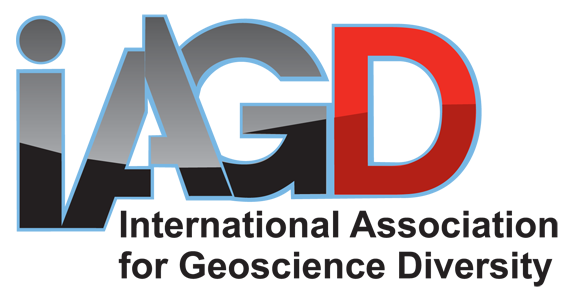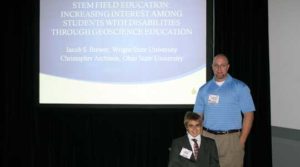Accessible Field Trip
On Saturday, October 18, thirty-five geoscience faculty and students from across the US, Canada, the UK and New Zealand came together to participate in the first fully accessible geology field trip offered at the Geological Society of America annual meeting: Field Trip 416, Full Access to the Geology of the Sea to Sky Highway. Led by Dr. Chris Atchison from the University of Cincinnati and Brett Gilley from the University of British Columbia, the trip was conducted with assistance from the International Association for Geoscience Diversity (IAGD) and supported by the National Science Foundation (NSF), the Society of Exploration Geophysicists (SEG), and the On to the Future Program at the Geological Society of America.
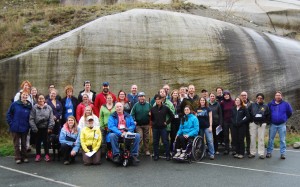
Accessible Field Trip Group (image credit (www.theIAGD.org)
This field trip was unique in having both students and geoscience faculty with disabilities participating. In fact, over one-half of the field trip participants self-disclosed a physical or cognitive disability, and eight students were first time attendees to the GSA meeting. While in the field, participants visited six carefully-selected and prominent locations between downtown Vancouver and Whistler, British Columbia. These locations offered opportunities for multi-sensory interaction and hence for everyone to participate, and be included in, the full geologic field experience. Examples of access and inclusion included large, flat areas adjacent to field sites for optimum viewing for everyone, tactile maps of specific field sites, and locations with up-close access to geologic features such as glacial striations and various rock hand samples. Evidence for the area’s rich geologic history was recognized from the glacial and volcanic processes and products that have created both beautifully dramatic landscapes, and created potentially destructive natural hazards.
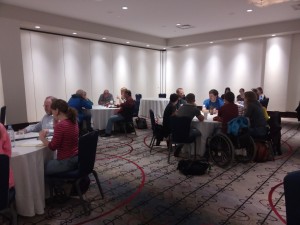
Pre-Trip group meeting (image credit www.TheIAGD.org)
During the trip, students and faculty participated in a research study being conducted by geoscience education researchers at the University of Cincinnati, Central Michigan University, and the University of Plymouth (UK). The study aims to explore the interaction between faculty and students during an inclusive field-based learning experience, i.e. one designed to accommodate both physical and cognitive disabilities, and the findings will be used to inform and influence the provision of future accessible fieldwork.
Many thanks for to GSA TV and WebsEdge Education [http://www.websedge.com/videos/education] for joining us during the trip and capturing the event in the following video: https://www.youtube.com/watch?v=I12H0Bwr-pQ&feature=youtu.be
For more information, please contact the International Association for Geoscience Diversity at info@theiagd.org.
University of Cincinnati promotion of the project: http://www.uc.edu/News/NR.aspx?id=20603.
IAGD Annual Meeting, Sunday, October 19, 4pm
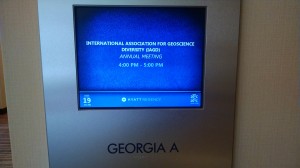
Proof that we had an actual meeting room with real tables and chairs this year! (image credit www.TheIAGD.org)
The 3rd Annual Meeting of the IAGD was held during the 2014 Geological Society of America Annual Meeting in Vancouver, British Columbia. Minutes from the 2014 IAGD Annual Meeting can be found at the link below. During this meeting, the group decided that we will not be following up with a virtual meeting in December, which in the past has been held to allow members and other interested individuals not able to attend the Annual Meeting to be included in ongoing topics and discussions. However, we will be holding a virtual meeting in the May/June time period as a way to update the membership with timely information, activities, and upcoming events leading up to the Annual Meeting. For the minutes of the 2014 IAGD Annual Meeting, please visit: https://theiagd.org/wp-content/uploads/2014/11/2014-IAGD-Annual-Meeting-Minutes.pdf
IAGD-IUGS/COGE Exhibit, Booth 319
The International Association for Geoscience Diversity (IAGD) and the International Union of Geological Sciences, Commission on Geoscience Education (IUGS-COGE) again collaborated by co-exhibiting at the 2014 Geological Society of America Annual Meeting, held in Vancouver, British Columbia, Canada, October 19-22. Exhibiting at booth #319, this was the third year for of the combined exhibit of IAGD and COGE resources in the GSA exhibit hall. All of these events successfully highlighted the increased awareness of what the IAGD – COGE collaboration has been working to achieve.
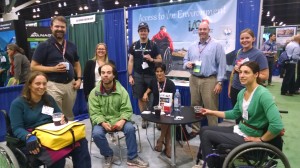
Field Trip Participants at the IAGD-COGE booth (image credit www.theIAGD.org)
The promotion of IAGD and COGE resources showcase the need for enhanced accessibility to geoscience education and workforce development for students and practitioners with disabilities. Members of the IAGD maintained the booth for all four days, holding many discussions with students and geoscientists alike. This resulted in an expansion of the network by over 100 members from several countries (more than twice that of the same time period last year), while also broadening awareness of this strong collaborative effort more generally.
The IAGD network continues to build membership on a global scale. The geoscience community is becoming even more cognizant of the importance of promoting effective geoscience instructional practices. Even more, as a result of collaborations like the IAGD/COGE partnership over the past three years, the geoscience community is becoming increasingly aware of the need to promote accessible and inclusive accommodations for students and geoscientists with diverse physical and cognitive abilities. Countries including India, Spain, Canada and the UK are becoming more involved in the IAGD network and promoting the awareness of inclusive geoscience instructional strategies, which should also be attributed to this collaboration between the IUGS-COGE and the IAGD.
The IAGD continues to be very grateful for the collaborative support of the IUGS-COGE. This partnership at the Geological Society of America Annual Meeting provides an excellent opportunity to promote the international efforts of accessible geoscience education. This partnership will undoubtedly pave the way for the future of workforce development in the geosciences, for students otherwise marginalized by the inaccessibility of a traditionally and physically rigorous scientific discipline.
We would like to continue to pursue this collaborative effort at the 2015 GSA meeting in Baltimore, Maryland, USA. Additionally, we would like to continue promoting shared resources, inclusive instructional workshops, and field-based learning opportunities to raise awareness of accessible geoscience education on a global stage.
Technical Session Presentation
Five days following the first ever accessible field trip at the Geological Society of America, the field trip leaders (Atchison and Gilley) and researchers (Feig and Stokes) presented preliminary findings in a Technical Session at the GSA Annual Meeting. This presentation was both audio recorded and captioned, and can be found at this link: https://www.youtube.com/watch?v=MWiefP5cagg
